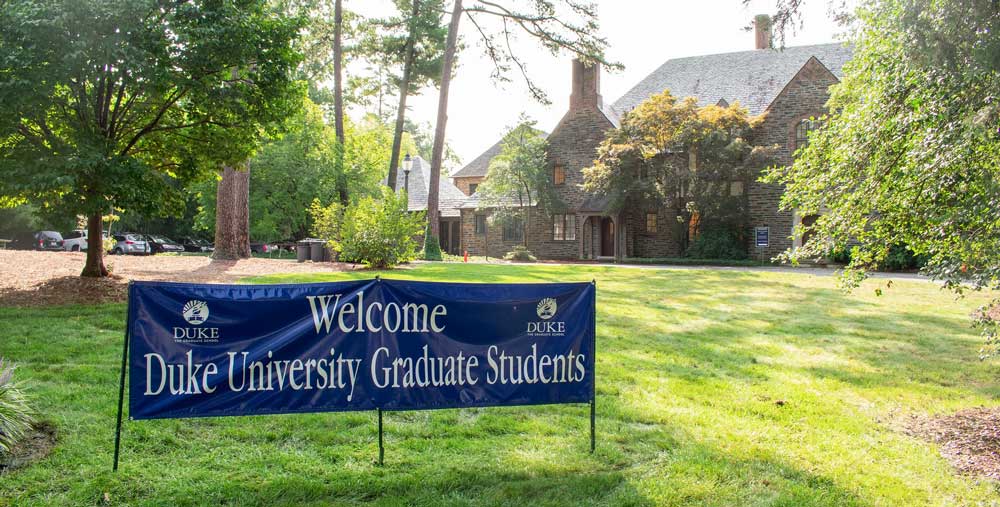By Maria LaMonaca Wisdom

“What should we focus on in our first semester?”
This question came up more than once in the small-group meetings I’ve had this week with new cohorts of Ph.D. students. It’s an excellent question, and a refreshingly practical one.
My advice? Spend time getting to know yourself and others.
“Know yourself?” what kind of stale, clichéd advice is that? This means get comfortable in your new identity as a doctoral student—an utterly unique identity at that. Much of identity formation in any new situation consists of watching and imitating others, and no doubt you will pay close attention to how your program faculty and fellow students present themselves and interact.
There’s value in this practice, but it also invites those nefarious twins, Comparisonitis and Impostor Syndrome. You may, for example, find yourself wishing that you expressed yourself as eloquently as a certain peer in a first-year seminar, and that you were as well-read in texts and methodologies foundational to your discipline.
It’s important to remember, however, that you weren’t chosen for your Ph.D. cohort because your application looked and read like everyone else’s. You offer unique value to your cohort, possibly in ways you don’t fully understand yet. Work on developing your immense potential, and don’t worry what you don’t know yet. You’re here to learn and engage after all—not to show off.
Part of forming your identity as a doctoral student also means developing a thorough understanding of your distinctive work habits. You might already have gotten to this point in an M.A. program, but the rigors of doctoral study often require students to reassess how they go about reading large volumes of text, taking helpful notes, and writing most productively and effectively.
Don’t feel intimidated by peers who pull all-nighters; it’s a terribly unhealthy practice anyway. And you may discover, perhaps to your surprise, that you are more productive when you don’t spend every waking moment on your coursework.
It’s most critical to remember, however, that it should never just be about you, your coursework, and your brilliant future. In graduate school, relationships are as important as ideas.
To some degree you already know this, having come to Duke to work with particular faculty members, whose role in your future academic success would be difficult to overstate. However, as we emphasize every year in The Graduate School’s mentoring workshops, it’s essential to develop a broad network of mentors and advisers, within and beyond your program, and ideally even beyond Duke.
So along with the essential work of finding your feet as a new doctoral student, get into the habit of building relationships and try not to overthink it. Simply put, reach out to people who seem fascinating to you.
It may be tempting to focus just on highly accomplished scholars and distinguished faculty, but I recommend that you start with fellow graduate students (you are amazing resources for each other) and fan out. If you’ve arrived at graduate school as someone’s spouse, partner, or parent, it can be easy to prioritize family duties over the department happy hour, but these social events also have immense professional value.
Along with cultivating professional connections, be a good citizen. You may be feeling a bit disoriented in the first semester; chances are, others do as well. Helping peers feel more at home in this new landscape will help you do the same.
As for cultivating relationships with scholars and faculty, you are sitting in a gold mine. There are highly distinguished faculty in your program, across Duke, and across the Triangle. If you are in Philosophy or Religious Studies or History, for example, don’t forget all the amazing scholars working beyond your Duke Ph.D. programs, over at UNC-Chapel Hill (just 30 minutes away via the Robertson bus, which runs on the half-hour). There’s also North Carolina State within easy reach, and many faculty working at more teaching-intensive institutions such as Elon and UNC-Greensboro have impressive research agendas as well.
Durham is also home to the National Humanities Center (a fifteen-minute drive from campus), which hosts about 40 residential humanities fellows per year. Although the fellows (mostly tenure-track and tenured college and university faculty) come to write books, they are also expected to engage with local scholarly communities (that’s you!). This may be a bit ambitious for your first semester, but at some point, when you feel ready, consider asking an NHC Fellow out to coffee to learn more about their research.
And that is the hook. You may be wondering why a very senior and distinguished scholar would make time for a new graduate student. You are expressing an interest in their work and are offering to serve as an intelligent and thoughtful conversation partner on topics that interest them. Opportunities for this kind of engagement can be surprisingly rare, even for senior scholars at R1 institutions.
Your invitation to coffee will likely happen over email. (Imagine the lid of Pandora’s Box creaking open here.) The awkward business of Networking for People Who are Statistically More Likely to be Introverts meets the Perils of the Digital Age. But these hurdles, too, can be overcome. In fact, the ability to write an engaging (brief) email of introduction to a potential professional contact or mentor is an invaluable professional tool, in any discipline. Look out for a blogpost on this topic in the near future, and in the meantime, enjoy your first few weeks of classes!
